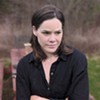Published December 11, 2002 at 10:29 p.m.
Lee Anderson's idea has been in the air for years: a cafe that offers fresh coffee, baked goods, free live music and a 1950s-style radio studio right in the front window, where anyone in the neighborhood can walk in off the street, get on the mike and speak his or her mind.
"The reason I started [the cafe] in the first place was for the radio part of it. That's why I called it Radio Bean," explains Anderson, the 25-year-old proprietor of the Burlington coffeehouse, a popular hangout for college students and local musicians. His vision of a community radio station -- a motley assortment of voices for whom no issue is too trivial -- is as rough-hewn and unpolished as the exposed brick walls of his cozy cafe.
"I really wanted to have a good representation of the Burlington community," says Anderson. "Say, [Mayor] Peter Clavelle and a drag queen from 135 Pearl and a professor from St. Mike's and some guy I just dragged off the street, who all sit down and debate housing in Burlington, or something like that."
A few years ago it seemed like all the planets were aligning in Anderson's favor when a storefront on North Winooski Avenue became available. Then in January 2000 the Federal Communications Commission (FCC) announced the creation of a new class of radio licenses called low-power FM (LPFM) that would make thousands of unused frequencies on the FM dial available to schools, nonprofits, religious groups and other community organizations around the country. In the interest of providing a voice to underrepresented groups and fostering greater diversity over the airwaves, the FCC ruled it would only license groups headquartered within 10 miles of the broadcast location.
"I wasn't exactly financially prepared or educationally prepared to start a business or a station, but I was, like, the time is now," recalls Anderson. So in June 2000 he submitted an application to the FCC for a 100-watt station at 105.9, a vacant slot on Burlington's FM dial.
And then he waited.
Tune in today to 105.9 FM and you won't hear any local politicos, professors, prima donnas or punks. You'll hear static. Though several community groups in Burlington also applied for LPFM frequencies, currently none is on the air. More than two years after the FCC closed the window on low-power license requests from Vermont, many groups haven't received so much as a postcard from the FCC informing them that their applications are in the works.
What's happening, or rather, not happening in Burlington is true elsewhere in the country. Despite the American public's overwhelming enthusiasm for low-power FM -- the FCC has received more than 3500 requests for new licenses since it began accepting applications in May 2000 -- the promise of democratizing the airwaves has amounted to a lot of dead air. Thus far, just 450 LPFM licenses have been issued nationwide, with only 63 stations currently up and running. And many of those licenses are for "asphalt radio," or roadway weather advisories operated by state transportation departments.
What happened? The delay has nothing to do with the relatively simple technical requirements of setting up a micro-radio station: a small room for a studio, a transmitter and a tall rooftop or hillside for the antenna. A 100-watt station, which can broadcast over a 3- to 5-mile radius -- or more, depending upon the weather and terrain -- can be assembled for as little as a few thousand dollars.
Not surprisingly, the static on low-power FM is coming from much larger sources. Immediately after the FCC announced the creation of low-power FM, the National Association of Broadcasters (NAB), the powerful lobbying arm of the broadcast industry, launched a full-scale assault against it. They claimed that low-power broadcasts would interfere with existing full-power stations, as well as the Reading Services to the Blind, which also use FM frequencies. At one congressional hearing, the NAB distributed a compact disc that it claimed was an example of LPFM interference. The CD was later debunked as a fabrication.
Opposition also came from an unlikely source, National Public Radio, which voiced concerns that smaller stations would create interference with its affiliates. The FCC has since commissioned an independent study of the effects of LPFM on full-power stations, which is due out next year.
Nevertheless, by December 2001 the NAB had convinced Congress to mandate wider gaps between new radio frequencies to act as buffers. By the FCC's own estimate, the result was a 75-percent reduction in the number of useable frequencies on the FM spectrum. And since existing licenses were unaffected, the new rule effectively made it impossible for many communities to get even one LPFM license, especially those in large media markets where the FM dial has been full for years. The original rules, which would have made room for 26 community stations in the top 10 media markets, now allow for only one in the top 50.
But changes in the law don't entirely explain why Radio Active Burlington and the Peace and Justice Center -- two local nonprofits that have applied for community radio licenses -- aren't on the air, says Pete Tri Dish of the Prometheus Radio Project, a Philadelphia-based advocacy group that helps groups around the country set up community radio stations.
"The FCC isn't stopping low-power FM. It's the law, so they can't turn around and say, 'No, you can't have it,'" says Tri Dish. "But they're not making it a priority." He says the glacial pace of LPFM licensing reflects the priorities of the FCC's current leadership, which seems more interested in placating large corporate interests than fostering grassroots voices.
"Our take is that a town without a community radio station is like a town without a library or a public school system," says Tri Dish. "Any town that doesn't have one is missing out on a key way for its citizens to communicate with each other and strengthen their cultural and political life."
For an agency with "communications" as its middle name, the FCC is remarkably tight-lipped on the subject of low-power radio. Two media spokespeople for the FCC in Washington, D.C., refused to answer questions from Seven Days about pending LPFM applications from Vermonters or the reasons behind their delay. Instead, they consistently repeated the mantra, "check our Web site." One refused to even give her last name.
As if anyone needs to be reminded, the airwaves, like national forests and navigable waterways, still belong to the American public. And there are those who argue that, like our natural resources, the "commons" of the airwaves have been woefully mismanaged or are not being used to promote the public interest. Some have tried reclaiming them via unlicensed or "pirate" stations. The operators of one such "free radio" station in Vermont declined to be interviewed by Seven Days for this story, fearing media attention would alert the FCC to their whereabouts. It's a legitimate concern, says Tri Dish, whose own pirate station, Radio Mutiny, in Philadelphia was shut down by the FCC in the late 1990s following a local newspaper profile.
Few LPFM applicants have grown frustrated enough with the process to begin broadcasting without a license, says Tri Dish. And although FCC foot-dragging hasn't greatly diminished the public's enthusiasm for community radio, it has eroded some of its financial backing. As community groups around the country face the prospect of not getting licensed before 2004 or 2005, some have begun to return the money they raised early on from donors. Tri Dish says he wouldn't be surprised if it takes another year or more for Burlington to get a community station.
While local groups around the country wait patiently for their tiny 100-watt sliver of the FM pie, FCC Chairman Michael Powell appears more interested in rolling back some of the last regulatory limits on media consolidation. In August, the media research group Project Censored, in its annual report of the year's most censored topics, listed as its number-one story moves by the FCC to privatize the airwaves entirely. In theory this would be done by auctioning off the few non-allocated bands of the radio spectrum to the highest bidder "as electronic real estate." With nothing left to regulate, writes Project Censored, the FCC could eventually be abolished.
Meanwhile, people like Anderson wait patiently for their applications to wend their way through the FCC maze. He says he won't go the pirate route for fear of having his broadcasting equipment -- and everything else in his cafe -- confiscated. Webcasting presents a possible alternative, Anderson says, but it can't compare to the ease and economy of a good old-fashioned radio signal.
"For me radio can be the most effective way of communicating community ideas," he says. "That's what I like about it. You can do other things while you're listening to it. Who ever does anything productive while watching TV?
More By This Author
Speaking of...
-

Soundbites: Half a Century on the Air, WGDR Looks to Its Future
Nov 22, 2023 -

Two Local Band Directors March in the Macy's Parade
Nov 22, 2023 -

Before a Burlington Show, the Wood Brothers Get Back to Basics
Oct 26, 2023 -

Vermont to Open $20 Million Business Flood Relief Fund
Jul 27, 2023 -

Video: Following Seven Days' Paper Trail to Québec
Jun 21, 2023 - More »
Comments
Comments are closed.
From 2014-2020, Seven Days allowed readers to comment on all stories posted on our website. While we've appreciated the suggestions and insights, right now Seven Days is prioritizing our core mission — producing high-quality, responsible local journalism — over moderating online debates between readers.
To criticize, correct or praise our reporting, please send us a letter to the editor or send us a tip. We’ll check it out and report the results.
Online comments may return when we have better tech tools for managing them. Thanks for reading.












































